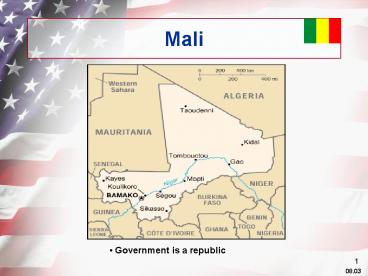Mali PowerPoint PPT Presentation
1 / 7
Title: Mali
1
Mali
- Government is a republic
2
Mali Environmental Issues
- Topography
- Climate
Terrain lowest point Senegal River 23 m
highest point Hombori Tondo 1,155 m
Subtropical to arid hot and dry February to
June rainy, humid, and mild June to November
cool and dry November to February
3
Mali Environmental Issues
- Air
- Most air pollution due to localized burning of
fuel, charcoal, wood, and brush (both deliberate
and non-deliberate). - Contaminants from these sources include oxides of
nitrogen and sulfur, particulates, and ozone. - Hot harmattan winds contribute to air
contamination with dust and other particulate
matter. - Soil
- Localized to specific areas surrounding
industrial facilities and waste disposal sites. - Significant exposure to contaminants in soil is
unlikely in the absence of wind-blown dust,
active digging, or migration of contaminants from
soil into ground water. - Usually presents a low risk to human health.
4
Mali Environmental Issues
- Food
- In rural areas, empty pesticide containers
reportedly are reused to store food products for
the public. - Food may also be contaminated with industrial
particulates, chemicals from soil, pesticides,
fertilizers, and fecal pathogens. - Water
- Untreated municipal sewage
- Industrial discharges in some waters
- Excessive use of agricultural chemicals-carbamate,
organochlorine, and organophosphate pesticides
contaminates some water. - Ground and surface water near gold mines can
contain levels of cyanide greater than US EPA
standards.
5
Mali Environmental Issues
- Greatest short-term environmental health risks
- Water contaminated with raw sewage
- Runoff containing fecal pathogens.
6
Mali Diseases ofOperational Importance
- Highest risk country
- Diseases of greatest risk
- Food and Waterborne Diseases Bacterial diarrhea,
Hepatitis A, protozoal diarrhea and
Typhoid/paratyphoid fever - Vector-borne Diseases Malaria
- Sexually Transmitted Diseases HIV/AIDS,
Hepatitis B - Water-contact Diseases Schistosomiasis
- Respiratory Diseases Meningococcal meningitis
7
Mali Diseases ofOperational Importance
- Diseases of potential risk
- Food and waterborne Diseases Brucellosis,Cholera,
Hepatitis E - Vector-borne Diseases Boutonneuse fever
(Mediterranean spotted fever), Chikungunya,
Crimean-Congo hemorrhagic fever, Dengue fever,
Leishmaniasis, Rift Valley fever, Sindbis
(Ockelbo) virus, Gambiense trypanosomiasis
(African), Murine typhus (flea-borne), West Nile
fever and Yellow fever - Sexually Transmitted Diseases Gonorrhea and
Chlamydia. - Water-contact Diseases Leptospirosis
- Respiratory Diseases Tuberculosis
- Soil-contact Lassa Fever
- Animal-contact Anthrax, Q-Fever and Rabies

